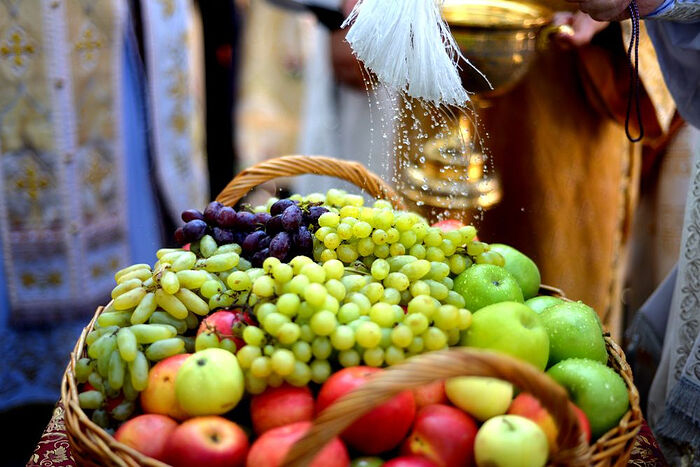
Feast of the Transfiguration & Blessing of Fruit – August 2025
This Feastday commemorates the moment on Mount Tabor when Christ revealed His divine glory to His disciples Peter, James, and John. His face shone like the sun, and His garments became dazzling white, offering a glimpse of the uncreated light of God. This event, rich in theological meaning, also has a deeply sacramental and liturgical expression: the traditional blessing of fruits, especially grapes, on this holy day.
- 18 August 2025 6 pm – All Night Vigil
- 19 August2025 10 am – Divine Liturgy, followed by the Blessing of Fruits
Parishioners are encouraged to bring with them to Divine Liturgy a basket of fruit to be blessed by our Fr. Oleg immediately following Liturgy. For Orthodox Christians, the blessing of fruit is done on the day commemorating the Transfiguration of Jesus Christ, when He let the light of His divinity shine through His human body to be seen by some of His disciples. Aside from celebrating the bounty God has provided, the blessing of fruit also serves as a reminder that everything God has created is good and can further our relationship with Him.
The event is understood as a revelation of Jesus’s divine nature and glory, foreshadowing His future resurrection and the glory of the Kingdom of God. It also serves as a powerful affirmation of Jesus’s divinity and His role as the Messiah.
In the Byzantine tradition, the blessing of fruits is not merely a quaint custom, but a profound liturgical and spiritual act. It is rooted in the biblical and agricultural calendar, in which August marked the beginning of the grape harvest in the Mediterranean world. The faithful would bring the first fruits of their labor—especially grapes, apples, and other seasonal produce—to the church to be blessed and offered in thanksgiving to God. This practice reflects the Old Testament commandment to offer the “first fruits” of the harvest (Exodus 23:19, Deuteronomy 26:1–11), acknowledging God as the source of all blessings.
Grapes are especially symbolic in this feast because they represent the Eucharist, the Blood of Christ poured out for the life of the world. The blessing of grapes serves as a reminder of the Paschal mystery, in which Christ’s Transfiguration points ahead to both His Passion and His Resurrection. Just as grapes must be crushed to produce wine, so must Christ suffer death to bring forth new life. Thus, the fruit of the vine becomes a powerful symbol of transformation, sacrifice, and divine joy.


